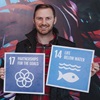In my recent Ocean Ideas Talk, part of the Ocean Lovers Festival, I delved into the intricacies and common misconceptions surrounding sustainable seafood. As a communication expert for the Marine Stewardship Council (MSC), I am passionate about protecting our ocean from overfishing, climate change, and pollution. Here’s my take on the myths surrounding sustainable seafood.
Busting myths around sustainable seafood
One of the threats to our ocean is misinformation. With such high levels of concern mixed with clutter and confusion, we risk being drawn into binary narratives that divide and divert rather than face problems with science-based solutions. Here are some of the common myths I hear about what is and isn't sustainable seafood.
- Big boats are bad: Many people believe that large fishing vessels are inherently harmful to marine environments. However, it's not the size of the boat that matters but rather the fishing practices and management systems in place. A large vessel adhering to sustainable practices can be more eco-friendly than numerous smaller, unregulated boats.
- Imported seafood is inferior: There's a common notion that imported seafood is less sustainable or safe compared to local varieties. In reality, sustainable seafood can come from both local and international sources. The critical factor is the fishing method and regulatory compliance, not the origin of the seafood.
- Some species are more sustainable than others: Another prevalent myth is that some fish species are inherently sustainable while others are not. Sustainability depends on how well specific fish populations are managed. For instance, the same species might be sustainably fished in one region and overfished in another.
- We should stop fishing: Ceasing fishing altogether is not practical. It would shift protein demand from the sea to land, exacerbating issues like deforestation and carbon emissions. Many people's livelihoods and primary protein sources rely on fishing. The United Nations recognises the need to feed a growing population and sees blue foods (aquatic foods) as crucial. These nutrient-dense foods, like fish, shellfish, and seaweed, are vital for addressing malnutrition and feeding the world.
What is sustainable fishing?
The MSC's standard for sustainable fishing is built on three core principles:
- Healthy fish populations: Ensuring that fisheries do not overexploit target species. This means catching fish at a rate where populations can replenish and thrive.
- Minimal ecosystem impact: Sustainable fisheries work to minimise bycatch (unintended catch) and protect the broader marine environment. This involves implementing techniques and technologies that reduce harm to non-target species and habitats.
- Effective management: Fisheries need robust management systems that comply with existing regulations and adapt based on scientific assessments. This includes regular monitoring, reporting, and updating practices to reflect new research and environmental conditions.
Importance of independent certification
One of the key points I emphasised is the need for independent certification systems like the MSC. These certifications provide consumers with assurance that their seafood is sustainably sourced. The MSC certification process is rigorous, involving comprehensive scientific assessments and independent audits. Certified fisheries are evaluated on their adherence to sustainability principles and are subject to ongoing surveillance to ensure they maintain standards.
When buying seafood, consumers should look for credible labels and claims like the MSC blue fish tick label. Many brands make self-made claims, but certifications from independent organisations like the MSC, ASC (for farmed fish), FSC (for paper and wood), and Fairtrade provide assurance.
The role of aquatic foods in global food security
The concept of "blue foods", aquatic foods such as fish, shellfish, and seaweed, holds significant promise for addressing global food security. The world's population is expected to reach nearly 10 billion by 2050, and sustainably managed seafood can play a vital role in feeding this growing number. Blue foods are often highly nutritious, providing essential nutrients like omega-3 fatty acids that are hard to find in other food sources.
Sustainable seafood is about protecting marine life and ensuring that future generations have access to these vital resources. Transitioning to sustainable fishing practices worldwide can help maintain marine biodiversity, support local economies, and provide a reliable food source.



.png?Status=Master&sfvrsn=8f0f562b_4)
.tmb-labelhome.jpg?Culture=en-AU&sfvrsn=9b5fd57e_3)